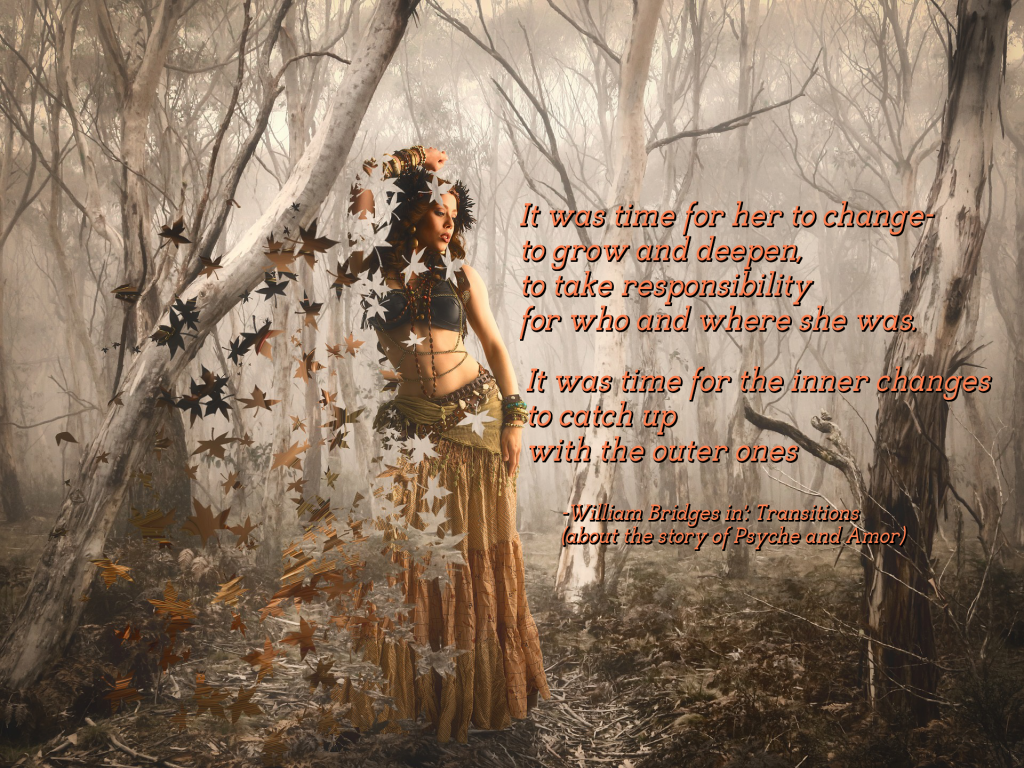When I was moving to China, I don’t remember much chaos in my mind, just lots of excitement. When I moved to Brunei the excitement wore off after exactly 3 days and the chaos in my head lasted for over 6 months.
I was in transition.
Transition is one of the main topics in my workshops on international moving. And no, by that I do not mean the honeymoon phase, where you are supposed to find everything about your new country fantastic (more about that some other time).
A transition is a deep change that we go through from time to time. Having a baby or going through a divorce are examples that signify a profound personal transition for many people. But seemingly small changes like getting a promotion at work may also be a transition for a person.
Each Move is Unique
Each move is unique. Moving to China without kids was vastly different than moving to Brunei with a toddler and a three month old baby. And moving after this will be different again. Our personal situations are different during each move. Having small kids, having kids who have just fled the nest, marital strains or parents back home with sudden health problems, but also how excited you are about your next destination, all of it will impact your feelings during the move.
Life Happens While You are Living It. Life goes on while you are moving.
It reminds me of the theme song of that that TV show from the early 90ies – Empty Nest.
Life goes on, and so do we,
Just how we do it is no mystery.
One by one (one by one), we fill the days,
We find a thousand different ways.
The Phases of Transition
At the same time, there are different phases that we go through. In short, we alternate between a status quo and chaos. We live somewhere (status quo, we are settled), we leave (chaos), we settle somewhere else again (status quo). Now, as humans are not machines, reality does not adhere to a theoretical model, but at least it gives us some idea of what moving is all about.
Foreign Element
In this process you can identify two defining moments (or perhaps a series of moments), a foreign element, followed later by a transformative moment.
First something happens during your status quo phase. It could be new job abroad, non- renewal of a contract, a company restructuring or sickness or a death in the family. This causes us to move. In this model that is called the “foreign element“
Chaos In Your Head
Then the Chaos Phase starts. This usually starts (long) before the moving boxes arrive. You can not see it on the outside yet, as it is a mental process. Your head is full of questions like where shall we live, what schools are there for my kids, will they have to be on a waiting list, what are going to do about Johnny our pet rabbit, how am I going to find a job there?
Chaos continues during the goodbyes and the actual move. Your emotions go up and down, more about that in my next posts.
But Chaos does not magically stop once you arrive at your new destination (unfortunately).
The first weeks and months in the new location continue to be a whirlwind of to do lists, finding out where to buy bread and where the school is located. You’re exhausted at the end of the day. At the same time, you may feel there is relative quiet once most boxes have been cleared, because as you do not know many people yet, you are not yet part of the circus of birthday parties and play dates.
Transforming moment
Then, it is Transformation time. At some point, there is a transforming moment. Often you realise that was transforming only in hindsight. That moment will allow you to move out of the Chaos phase and into the Integration phase. For me, my Brunei transformational moment was two fold: it was moving to our permanent house after 7 months. Only then it began to feel like I had truly arrived. But it was also a conscious decision to stop comparing my old life to my new life in Brunei. I started appreciating the natural beauty of Brunei and its friendly people, rather than thinking back of all the fun things I used to do in Beijing. Transformation could also be finding a likeminded friend, discovering a very nice coffee shop or finding meaningful (volunteer) work.

Integration
In the Integration phase, you start to feel more and more at home at your new destination. You know your way around, you found some friends, life is starting to feel normal again. There are still moments where you feel on shaky ground, but chaos has ended, both of the moving and in your head.
New Status Quo
And then you slowly but surely move on to the new Status Quo- where life at your new destination has become normal again. The line in Status Quo is not flat, life goes on with ups and downs, but you feel more stable and grounded in general. Until it is time to move again.
How long does it take?
Many expats say it takes about a year to really feel at home in a new place. Not to worry, that doesn’t mean that you spend a year in chaos. It just means that it is perfectly normal that you wonder after 5 months whether it is normal that your friendships do not yet feel the same or whether you have made the right decision to move. Usually after a month or 6 you get to the integration phase, but it is only when you experience things for the second time (like second Christmas or second International Day at school) that it becomes the “New Normal.”
In Beijing I was pretty settled after 5 months, in Brunei it took me over a year, maybe even 1,5 years. How about you? When did you feel you were settled?
The emotions in these phases
What do you think? What emotions come in each phase? I will write about that next time, but you are most welcome to put your thoughts in the comments below.
PS. This is based on the Satir model (originally used for family relationships). I want to thank to my colleague Rubina Anis at Clarity Brunei for introducing me to it.
PPS. This model can also be applied to repatriation. Many people underestimate the impact of moving back home after time abroad. I wrote about that on my blog a while back: http://www.copatcoaching.com/uncategorized/back-home-heart-not/




